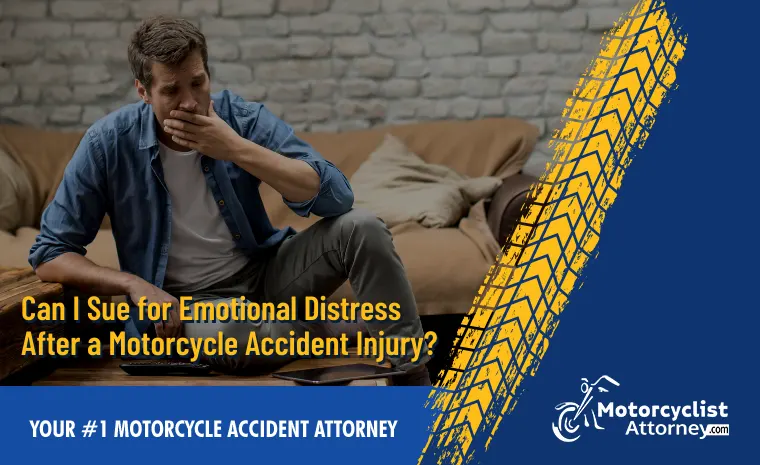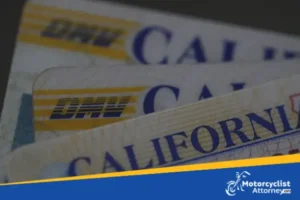Can I Sue for Emotional Distress After a Motorcycle Accident Injury?
In the aftermath of a motorcycle accident, injuries are often visible immediate concerns. However, the impact of such a traumatic event extends beyond physical harm, delving into the complex and often overlooked territory of emotional damages. Beyond broken bones and road rash, people involved in motorcycle accidents frequently struggle with a range of emotional and psychological consequences that can be just as debilitating, if not more so, than their physical injuries.
California recognizes the possibility of seeking compensation for emotional damages in motorcycle accident injury cases, including those arising from motorcycle accidents. These emotional damages are typically referred to as “pain and suffering” and may encompass a range of emotional distress, such as anxiety, depression, post-traumatic stress disorder, and more.
The law allows victims to pursue both financial losses (such as medical expenses and lost wages) and non-economic damages (mental anguish, pain and suffering) in personal injury cases. However, the specific rules and limitations when you sue for emotional damages after a motorcycle accident can be complex and may depend on various factors, including the severity of the injuries, the circumstances of the accident, and the impact on your daily life.
In this blog we will explore the intricacies of emotional damages in the context of motorcycle accident injury, shedding light on the importance of recognizing, understanding, and seeking compensation for the mental distress these incidents can cause. In specific, we’ll offer an overview of the following points:
- Defining emotional damages.
- The criteria for emotional damage compensation.
- The challenges and limitations of emotional damages.
- Types of recoverable emotional damages.
Defining Emotional Damages
In a legal context, “emotional damages” refer to the mental suffering or distress that a person experiences in their daily life as a result of someone else’s wrongful actions or negligence. These damages can include feelings of anxiety, sadness, trauma, or other emotional suffering, and can have significant consequences for the victim of a negligent action such as a motorcycle crash. These consequences can vary in severity and duration, and encompass a wide range of effects on a person’s well-being.
One common consequence, for example, is psychological distress. Victims may experience feelings of depression or overwhelming sadness as the result of an accident. In more severe cases, it can even lead to post-traumatic stress disorder (PTSD), characterized by symptoms like flashbacks, nightmares, and severe anxiety disorders. This damage can even be manifested in physical symptoms, leading to headaches, sleep disturbances, and digestive problems.
Victims may find it challenging to maintain healthy relationships with friends and family due to their emotional suffering. The strain on these relationships can further exacerbate their mental health issues. In the workplace or at school, for instance, emotional damages can impair an individual’s ability to perform well, resulting in absenteeism, decreased productivity, or even loss of employment or academic setbacks.
In other words, they can significantly reduce a person’s quality of life, affecting their daily activities and overall well-being. Addressing emotional damage is crucial for the well-being of a person, and by suing for emotional damages, you can lighten some of these consequences by getting financial assistance, therapy treatments, and other forms of support you deserve.
The Criteria for Emotional Damage Compensation
When talking about motorcycle accident injuries, physical consequences are only part of a larger picture. The intricacies of emotional distress are wide, so in order to sue for emotional damages in California, several criteria typically need to be met. These criteria include:
Duty of Care
The defendant must owe you a duty of care. This means they have a legal responsibility to act in a certain way to prevent harm to you or others. To prevent traffic accidents, for example, people must drive responsibly and obey the relevant laws. In legal proceedings, you must show that the defendant breached their duty of care, and failed to meet the standard of care expected under the circumstances.
Causation
You must establish a direct link between the defendant’s breach of duty and your mental suffering. Or, in other words, you or your attorney need to demonstrate that their actions or negligence during a motorcycle accident directly caused your emotional harm.
Severity of Emotional Trauma
Emotional distress must be significant and severe. Minor inconveniences or temporary distress typically do not provide a sufficient basis for an emotional damages claim, so you usually need to prove that the distress resulted in substantial emotional suffering.
Documentary Evidence
It can be helpful to provide evidence to support your claim, such as medical bills, expert testimony, or other documents that substantiate the severity and cause of your emotional damages and other motorcycle accident injuries.
Statute of Limitations
There’s a time limit within which you can file a claim. It’s essential to make the necessary paperwork and procedures within the specified statute of limitations, which varies depending on the type of case and jurisdiction; in the case of personal injury in California, it’s 2 years.
Pain and Suffering Damages
Non-economic damages like these usually fall under the category of “pain and suffering” in personal injury cases. You should be prepared to quantify your emotional distress and present a reasonable amount of compensation sought.
Legal Representation
It’s highly advisable to consult with an attorney for a personal injury lawsuit if you have an emotional distress case. They can help you understand the specific laws in California and guide you through the legal process.
Keep in mind that emotional distress damages can be complex, and the specific requirements and standards may differ depending on both the type of case (e.g., negligence, intentional infliction of emotional distress) and if it falls in California’s jurisdiction. Consulting with a California personal injury attorney is crucial to determine if you have a valid claim for emotional damages and to help you navigate the legal process effectively.

The Challenges and Limitations of Emotional Damages
To sue for emotional damages can be very challenging due to the subjective nature of emotions and the complexities involved. Some of the challenges and limitations you and your legal representant might encounter when trying to prove emotional damages include:
- Subjectivity: Emotions are inherently subjective, making it difficult to measure or quantify emotional distress. What is distressing to one person may not be to another.
- Lack of Physical Evidence: Unlike physical injuries, non-economic damages often leave no visible or tangible evidence. This absence of concrete proof can make it challenging to establish the existence and severity of emotional damages.
- Corroboration: It can be difficult to provide corroboration or independent witnesses who can attest to the emotional distress experienced. In many cases, emotional distress occurs in private or within a person’s own mind.
- Stigma and Skepticism: There can be societal stigma and skepticism associated with emotional distress and mental pain claims, which may lead to a lack of sympathy or understanding from the negligent party, the insurance company, or the public.
- Duration and Severity: Demonstrating the negligent infliction, severity, and duration of emotional distress is often essential for a successful claim. However, these aspects can be challenging to prove, especially if the distress is ongoing or if it is not consistently documented.
- Pre-existing Conditions: If the plaintiff had preexisting emotional or mental health conditions, defendants in a civil lawsuit may argue that these conditions, rather than the defendant’s actions, were the primary cause of the emotional distress.
- Expert Testimony: In some cases, expert witnesses like mental health professionals may be required to establish the extent of emotional distress. Finding the right experts and presenting their testimony effectively can be a complex process.
- Challenges in Damages Assessment: Determining the appropriate amount of compensation for emotional damages is challenging. There are no fixed formulas, and it’s often left to the discretion of the involved parties, which can lead to highly varying outcomes.
- Burden of Proof: The burden of proof typically falls on the plaintiff or accident victim to establish their case, which means they must provide sufficient evidence to persuade the court. This can be challenging in emotional distress cases due to the nature of the claim.
- Privacy Concerns: In some cases, plaintiffs may have to divulge sensitive personal information to substantiate their claim, which can raise privacy concerns.
Given these challenges and limitations, it’s crucial to consult with an experienced attorney who specializes in personal injury or emotional distress cases. They can provide guidance, build a compelling case, and navigate the legal process effectively to help you seek the compensation you deserve.
Finding the Right Legal Help
Emotional damages can factor into a compensation claim, particularly in cases where people experienced significant emotional distress due to someone else’s negligence. And the role of an attorney is crucial during this process. The types of recoverable emotional damages can vary from case to case, but generally you can claim the following.
Types of Recoverable Emotional Damages
- Pain and Suffering: Serves as the primary category of compensation for emotional damages, and aims to provide financial compensation for the emotional distress, anxiety, depression, fear, and other psychological suffering caused by a person’s actions. The amount awarded depends on the severity and duration of your emotional distress.
- Mental Anguish: Compensation for mental anguish is often included in pain and suffering damages, covering the psychological harm you endured as a result of the other party’s negligence.
- Loss of Enjoyment of Life: When emotional distress significantly impairs a person’s ability to enjoy life’s pleasures, they may be entitled to compensation for the loss of enjoyment of life.
Attorneys, then, fulfill a crucial role in the process of seeking compensation for these legal claims. They assess the strength of your emotional damages claim by evaluating the circumstances of your case, consider the specific laws and standards that apply, and help determine the validity of your claim.
A personal injury lawyer is also responsible for gathering evidence to substantiate your emotional distress claims. This may include medical records, expert testimony from mental health professionals, witness statements, and any documentation supporting the emotional distress you’ve endured. Afterwards they can calculate the damages, drawing upon their experience, they determine a reasonable amount of compensation for emotional damages.
In short, in emotional distress lawsuits, the attorney’s role is to provide legal expertise, protect your rights, and relieve you from the mental stress associated with fair compensation claims you deserve due to the actions of others. For that reason, choosing the best legal help possible is critical to ensure your long-term physical and emotional health, gaining back the life that was altered by an unfortunate incident.
Motorcyclist Attorney is Here to Help
Were you involved in a motorcycle accident in California? Is your mental health suffering as a consequence of other people’s negligence? Your planning to sue for emotional distress? Having an experienced motorcycle accident attorney on your side to take legal action is always the best option. At Motorcyclist Attorney, our team of motorcycle accident lawyers will ensure you recover the compensation you deserve.
Our motorcycle accident lawyers want to relieve you of the burden as much as we can, which is why we operate on a contingency fee basis, which means you don’t have to pay us a single cent unless we win your case. Call us at (844) 284-9437 for a free, no-obligation consultation. Your emotional injuries matter!




